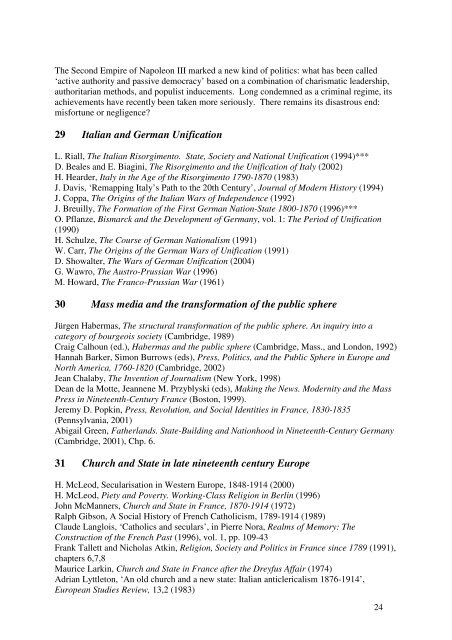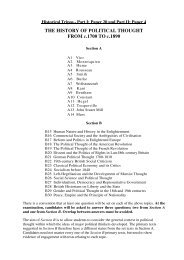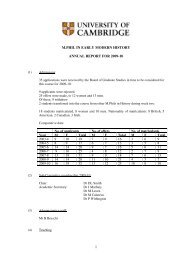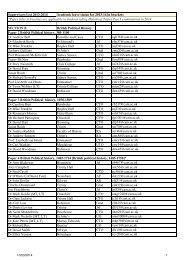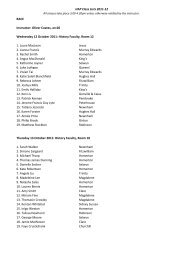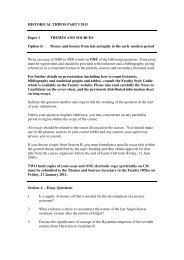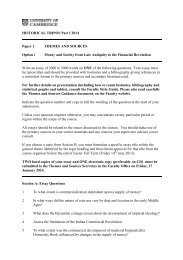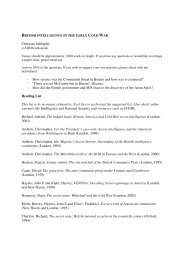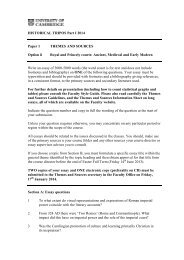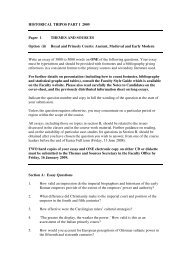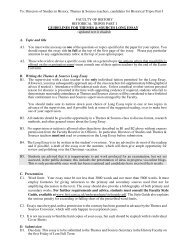Historical Tripos, Part I Paper 17 European History 1715-1890
Historical Tripos, Part I Paper 17 European History 1715-1890
Historical Tripos, Part I Paper 17 European History 1715-1890
Create successful ePaper yourself
Turn your PDF publications into a flip-book with our unique Google optimized e-Paper software.
The Second Empire of Napoleon III marked a new kind of politics: what has been called<br />
‘active authority and passive democracy’ based on a combination of charismatic leadership,<br />
authoritarian methods, and populist inducements. Long condemned as a criminal regime, its<br />
achievements have recently been taken more seriously. There remains its disastrous end:<br />
misfortune or negligence?<br />
29 Italian and German Unification<br />
L. Riall, The Italian Risorgimento. State, Society and National Unification (1994)***<br />
D. Beales and E. Biagini, The Risorgimento and the Unification of Italy (2002)<br />
H. Hearder, Italy in the Age of the Risorgimento <strong>17</strong>90-1870 (1983)<br />
J. Davis, ‘Remapping Italy’s Path to the 20th Century’, Journal of Modern <strong>History</strong> (1994)<br />
J. Coppa, The Origins of the Italian Wars of Independence (1992)<br />
J. Breuilly, The Formation of the First German Nation-State 1800-1870 (1996)***<br />
O. Pflanze, Bismarck and the Development of Germany, vol. 1: The Period of Unification<br />
(1990)<br />
H. Schulze, The Course of German Nationalism (1991)<br />
W. Carr, The Origins of the German Wars of Unification (1991)<br />
D. Showalter, The Wars of German Unification (2004)<br />
G. Wawro, The Austro-Prussian War (1996)<br />
M. Howard, The Franco-Prussian War (1961)<br />
30 Mass media and the transformation of the public sphere<br />
Jürgen Habermas, The structural transformation of the public sphere. An inquiry into a<br />
category of bourgeois society (Cambridge, 1989)<br />
Craig Calhoun (ed.), Habermas and the public sphere (Cambridge, Mass., and London, 1992)<br />
Hannah Barker, Simon Burrows (eds), Press, Politics, and the Public Sphere in Europe and<br />
North America, <strong>17</strong>60-1820 (Cambridge, 2002)<br />
Jean Chalaby, The Invention of Journalism (New York, 1998)<br />
Dean de la Motte, Jeannene M. Przyblyski (eds), Making the News. Modernity and the Mass<br />
Press in Nineteenth-Century France (Boston, 1999).<br />
Jeremy D. Popkin, Press, Revolution, and Social Identities in France, 1830-1835<br />
(Pennsylvania, 2001)<br />
Abigail Green, Fatherlands. State-Building and Nationhood in Nineteenth-Century Germany<br />
(Cambridge, 2001), Chp. 6.<br />
31 Church and State in late nineteenth century Europe<br />
H. McLeod, Secularisation in Western Europe, 1848-1914 (2000)<br />
H. McLeod, Piety and Poverty. Working-Class Religion in Berlin (1996)<br />
John McManners, Church and State in France, 1870-1914 (1972)<br />
Ralph Gibson, A Social <strong>History</strong> of French Catholicism, <strong>17</strong>89-1914 (1989)<br />
Claude Langlois, ‘Catholics and seculars’, in Pierre Nora, Realms of Memory: The<br />
Construction of the French Past (1996), vol. 1, pp. 109-43<br />
Frank Tallett and Nicholas Atkin, Religion, Society and Politics in France since <strong>17</strong>89 (1991),<br />
chapters 6,7,8<br />
Maurice Larkin, Church and State in France after the Dreyfus Affair (1974)<br />
Adrian Lyttleton, ‘An old church and a new state: Italian anticlericalism 1876-1914’,<br />
<strong>European</strong> Studies Review, 13,2 (1983)<br />
24


